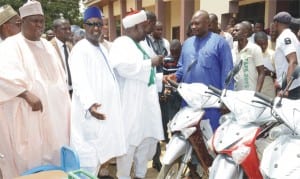Business
NLC President Inaugurates Eight-Member Reconciliation Committee

The District Head of Gabasawa, Alhaji Jibrin Mohammed, presenting keys of a motorcycle to one of the beneficiaries of Umar Sani Foundation’s 2nd Youth Empowerment Programme in Kaduna, yesterday. With them are Governor Ramalan Yero of Kaduna State (2nd left) and the sponsor and Senior Special Assistant to the Vice President on Media and Publicity, Umar Sani.
The President of the Nigeria Labour Congress (NLC), Mr Ayuba Wabba, has in Abuja inaugurated an eight-member reconciliation committee to look into issues arising from the 11th Delegates’ Conference.
It would be recalled that during the conference, Wabba of Medical and Health Workers Union and the immediate past treasurer of the union emerged as the new NLC president.
He defeated Joe Ajaero of the Nigeria Union of Electricity Employees (NUEE) by polling 1, 695 votes of the 3,115 total votes cast.
Ajaero, who polled 1, 140 votes and delegates from 23 unions contested the outcome of the election held in Abuja.
They went to Lagos and organized another election that led to the emergence of Ajaero as the factional president of the NLC.
The eight members committee is headed by Mr Aliyu Dangiwa.
The other members are: Mr Peters Adeyemi, Mr Amaechi Asugwuni, Mrs Comfort Oko, Mrs Amina Danesi, Mr Ero Philips and S.O.Z Ejiofor.
The committee has two weeks to complete its assignment.
Inaugurating the committee, Wabba urged the members to bring back the aggrieved members and their unions to the mainstream of the congress.
“I had earlier said that the new executive will use internal and external means to reconcile the aggrieved parties.
“This is one of the mechanisms adopted by the National Administrative Council (NAC), to achieve that.
“The NLC needs to forge ahead and we cannot achieve that with a divided house,” he said.
Wabba stressed the need for the committee to convince the aggrieved members especially Mr Joe Ajaero, Mr Issa Aremu and Mr Igwe Achese to join forces with the new leadership.
He said that the peace and progress of the Nigerian labour movement would only be guaranteed when members look beyond personal interests.
In his response, Dangiwa commended the National Administrative Council for finding them worthy of handling the task assigned to them.
He promised to bring the aggrieved members to a round table with a view to ironing out the identified differences.
Dangiwar, who was the pioneer General Secretary of the NLC, urged the new executive to steer the affairs of labour movement in Nigeria with the fear of God in the next four years.
Meanwhile, the newly elected president of the Joint Health Sector Union Mr Olawale Ogundele, on Wednesday paid a solidarity visit to the new NLC President Mr Ayuba Wabba.
He urged Wabba to remain focused in his determination to take the congress to an enviable height within the shortest time and promised to mobilise his members in support of the new NLC executive.
Business
NCDMB, Jake Riley Empower 250 Youths On Vocational Skills

Business
NUJ Partners RSIRS On New Tax Law Education

Transport
Nigeria Rates 7th For Visa Application To France —–Schengen Visa

-

 Politics3 days ago
Politics3 days agoPFN Rejects Call For INEC Chairman’s Removal Over Genocide Comments
-

 Rivers3 days ago
Rivers3 days agoFasthire, PHCCIMA, CIPM Host CareerFest 2026 In PH
-

 Sports3 days ago
Sports3 days agoEnekwechi wins Orlen Cup in season opener
-

 Politics3 days ago
Politics3 days agoHoodlums Disrupt LP-ADC Defection Event In Lagos
-

 Sports3 days ago
Sports3 days agoFalconets, Senegalese Lionesses arrive Ibadan for qualifier
-

 Sports3 days ago
Sports3 days agoSimba open Nwabali talks
-

 Politics3 days ago
Politics3 days agoRemoval From INEC’s Portal, Abure-Led LP Faction Mulls Legal Action
-

 Niger Delta3 days ago
Niger Delta3 days agoTinubu, Jonathan, Diri Pay Last Respect To Ewhrudjakpo

